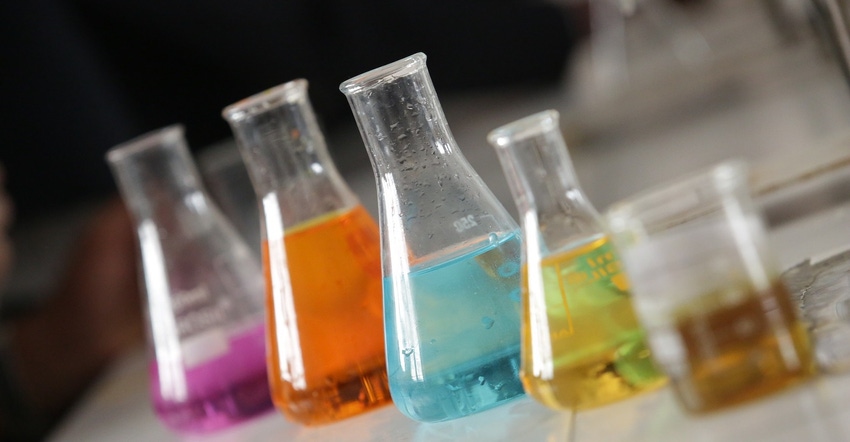Chemours Works to Reduce Emissions and Other Chemical Industry News
Powder & Bulk Solids highlights recent chemicals manufacturing news you may have missed.

Chemicals firm Chemours announced plans this week for an improvement project at its Louisville, KY production facility that will lower process emissions of HFC-23. Custom designed and built proprietary technology will be installed capable of capturing at least 99% of the hydrofluorocarbon at the site.
While HFC-23 is used commercially in ultra-low temperature refrigerants for vaccines, medical use, and the semiconductor industry, it is also a greenhouse gas that can contribute to global warming.
“Our Louisville site currently captures a majority of HFC-23 process emissions. We’ve also implemented other process improvements to reduce the amount of HFC that gets created,” said Tim Byrd, vice president, operations, Advanced Performance Materials, in a release. “It’s taken us some time to get here, but we are pleased to have initiated this next piece of our emission control plan that will allow us to capture at least 99% of HFC-23 process emissions and move us closer to meeting our overall goal of a 99% reduction in fluorinated emissions.”
The project is expected to reach completion by the end of next year.
Here are some other developments in the chemical industry that captured headlines over the last week:
BASF Increases Acrylic Dispersions Output
German chemicals firm BASF has added a new production line at its plant in Pasir Gudang, Malaysia that doubles the site’s output of acrylic dispersions, a recent company release announced.
The line will manufacture new dispersions technologies sold under the Arronal EDGE, Acronal PLUS, Joncryl, and Acronal ECO product ranges to the coatings, construction, adhesives, and packaging industries.
The chemical company commenced operations on its first acrylics dispersions production line in the Pasir Gudang plant in 2015.
Large Fire Breaks Out at TATA Chemicals Plant
Firefighters from multiple area fire departments were sent to the TATA Chemicals Europe plant in Northwich, UK Thursday morning after a massive fire ignited in the facility that forced workers to evacuate.
“Two fire engines from Northwich were initially dispatched to the scene and on arrival they found a fire involving electrical equipment within an industrial building,” Cheshire Fire & Rescue Service said in a release.
Firefighters were sent to the scene at about 7:20 a.m. and worked for several hours to douse the 10m by 40m fire, the emergency response agency stated. Flames reached as tall as 30m, burning through the structure’s timber-framed roof.
Chemical Firm Fined $782K After Powder Charging Chute Injury
Chemical manufacturer CalaChem is facing a £560,000 (about $782,000) fine following a 2016 incident at its Grangemouth, Scotland plant that injured an employee, the UK’s occupational safety regulator, The Health & Safety Executive (HSE) recently announced.
A worker was severely injured as scalding water erupted out of a chemical powder charging chute when a valve was opened during a cleaning process. HSE inspectors determined that a safe cleaning process involving cold water had changed over time.
Hexion to Add Automated Production Line at US Plant
Thermoset resins manufacturer Hexion is preparing to launch an expansion project at its Portland, OR plant to add a second automated production line at the site to produce its new ArmorBuilt fire resistant wrap, the Columbus, OH-based firm announced this week.
The first automated line is slated to become operational in the first quarter of this year. Hexion is currently working to secure permits for the second automated manufacturing line, and the company expects the assets to start up around the end of 2021.
Bulk Chemical Plant Explosion and Fire Kills 2, Injures 4
Two workers were killed, and four others were injured in an explosion and fire Thursday at the Tyche Industries Ltd bulk chemical plant near Kakinada, Andhra Pradesh, India, local news organizations reported.
The blast happened at about 3 p.m. Accounts varied on the circumstances that led up to the explosion. Police said in coverage by The Hindustan Times that a valve was being tightened on a nitric acid pipeline connected to a boiler when two boilers exploded. Another official told OneIndia that the blast was caused by excessive heat created when two chemicals were mixed in a reactor.
Agriculture Minister Kurasala Kannababu visited the Tyche plant in the wake of the explosion and fire and pledged to offer financial assistance to the victims of the incident.
For more chemical industry articles, click here.
About the Author(s)
You May Also Like




